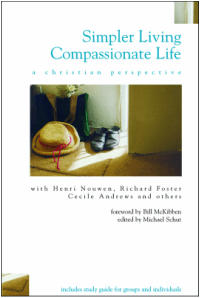
Image courtesy of mikeschut.com
Simpler Living, Compassionate Life: A Christian Perspective (1998) grew out of a curriculum created by Michael Schut in 1996 and published by Earth Ministry. The early success of the curriculum led to its expanded publication as a larger collection. Featuring essays by Cecile Andrews, Henri Nouwen, Frederick Buechner, and many more, this collection touches many topics surrounding humanity’s relationship to our earthly home. In addition to the essays, the book includes 70 pages of additional material to help guide communities as they engage this book, making it a wonderful choice for book groups. This book is obviously meant not just to be read, but engaged, and engaged in community most of all.
Any work attempting to examine the global economy, everyday food choices, social structures, justice, and more will confront a problem of accessibility for readers without theological or ecological degrees. However, for those willing to take the time to move a little bit more slowly and intentionally through the selections, readers will find that Schut’s careful curation has created an accessible approach to the interconnected nature of our relationship to the natural world. The authors who contribute to this collection argue for a new way of moving through the world, voluntary simplicity inspired and grounded in a Christian faith that recognizes the sacred nature of all life.
Simpler Living, Compassionate Life can be found at most major book retailers, including Amazon here, and through your favorite independent bookstore. More detailed information on the sections of the book, including reviews for each section and author profiles can be found at the hyperlinks below. (Hyperlinks currently in progress.)






